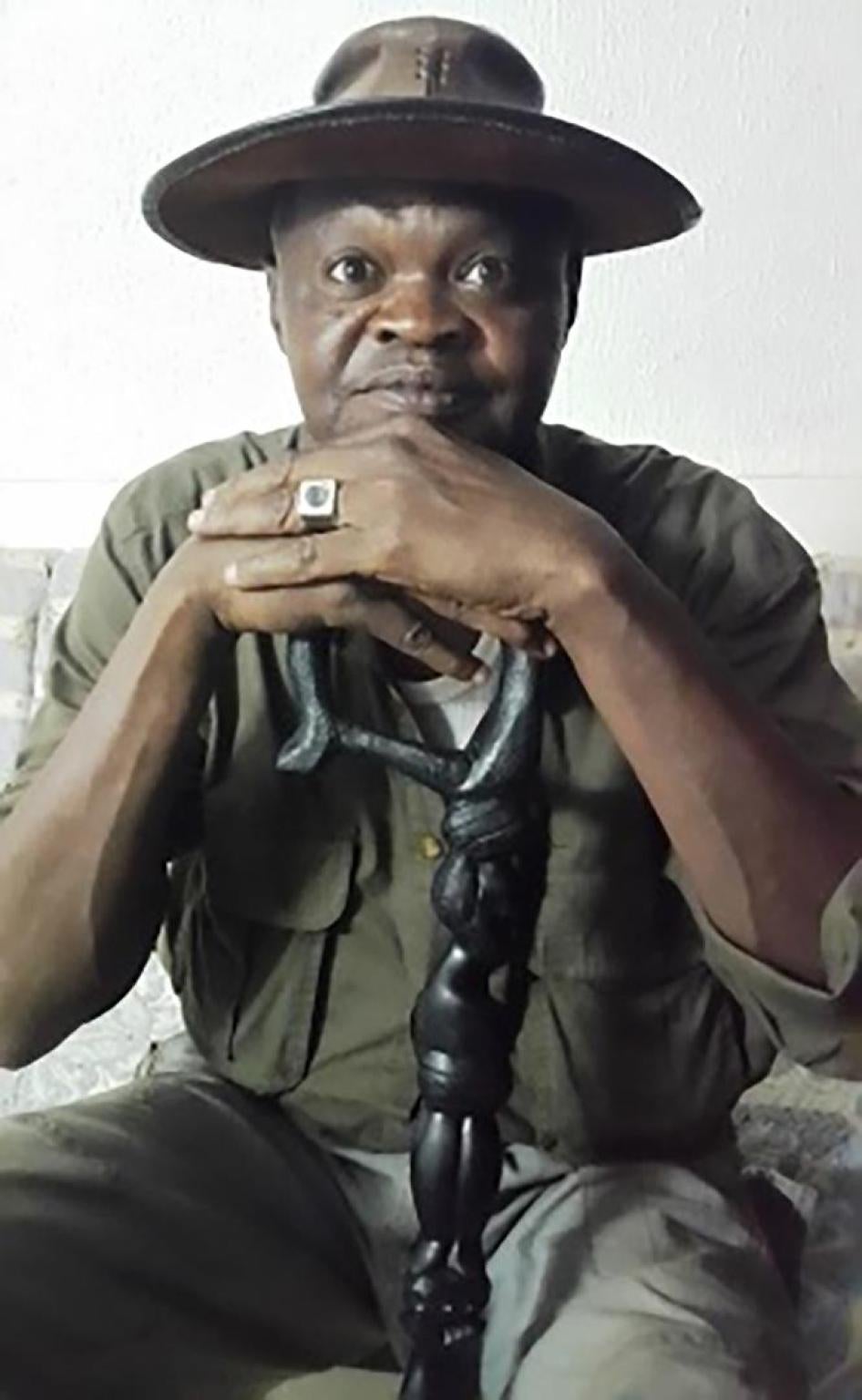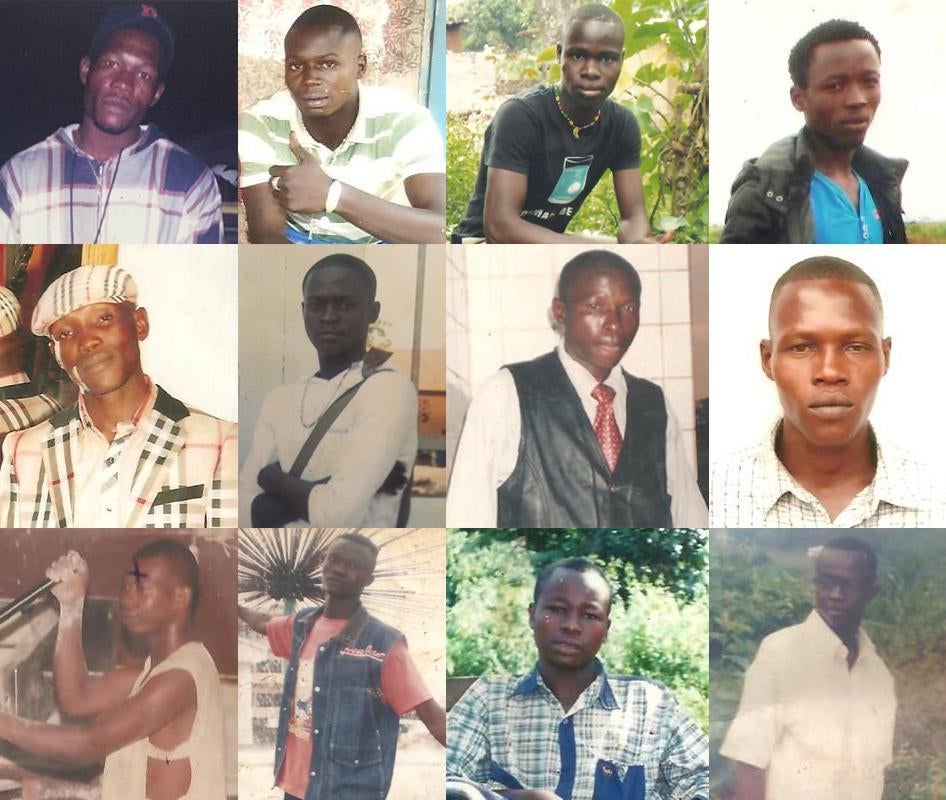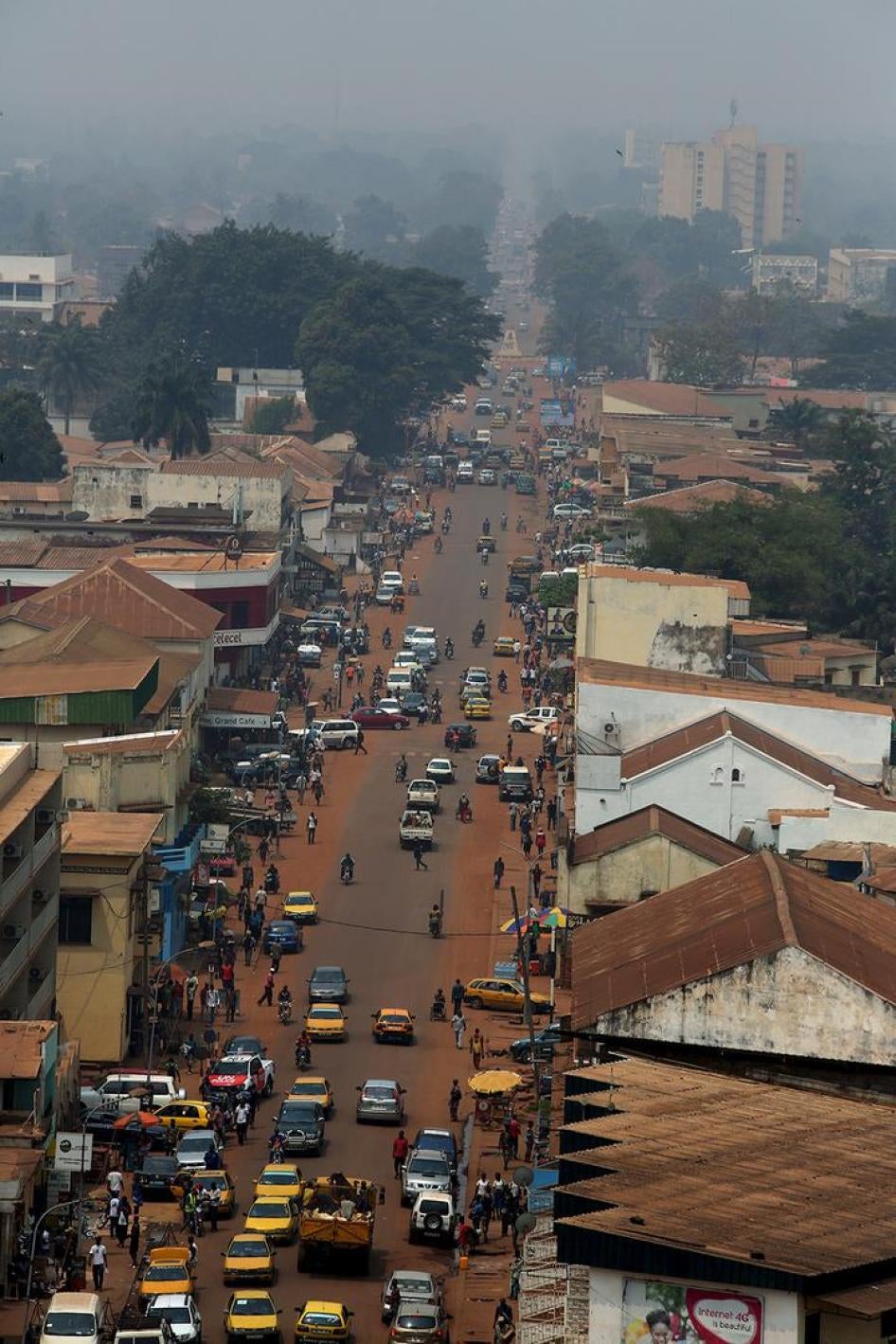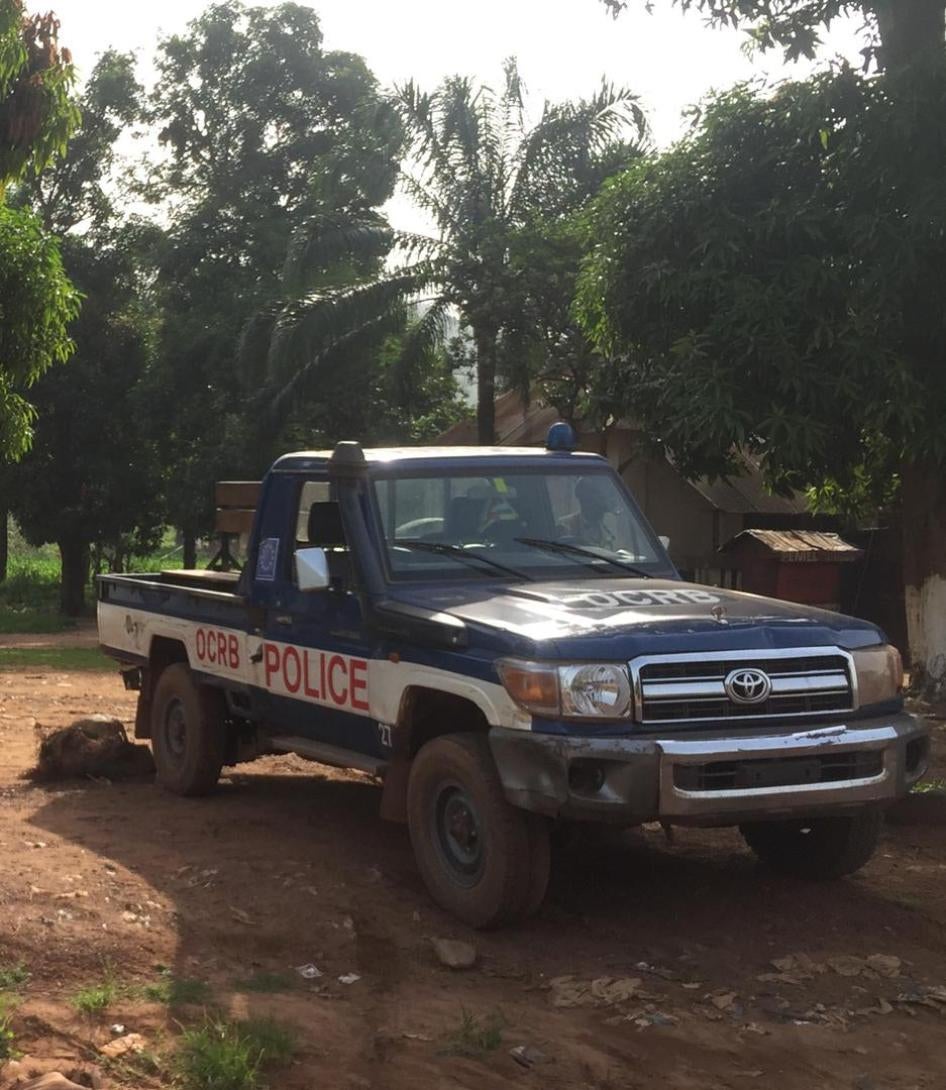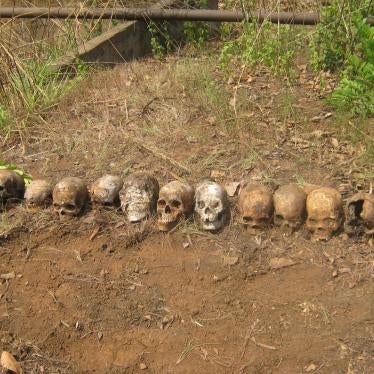(Nairobi) – Members of a special anti-crime unit in the Central African Republic unlawfully executed at least 18 people and possibly more between April 2015 and March 2016, Human Rights Watch said today.
The former director of the unit, the Central Office for the Repression of Banditry (
Office Central de Répression du Banditisme, OCRB), Robert Yékoua-Ketté, who was removed from his position on June 8, is directly implicated in 13 of the cases and should be investigated with a view to prosecuting him.
“The government was right to remove Yékoua-Ketté as the first step in addressing impunity, but residents saw him and his men kill people in broad daylight,” said
Lewis Mudge, Africa researcher at Human Rights Watch. “Central Africans will not believe there can be rule of law and will live in fear of the OCRB unless the man they saw killing people faces justice.”
Of the 18 killings, witness testimony indicates that Yékoua-Ketté personally carried out one; ordered the execution of five; and was seen at the moment when seven men, who were later killed, were detained by the OCRB.
The government of the Central African Republic should promptly open an effective, transparent investigation into all the suspected extrajudicial executions by the OCRB, which operates in the capital, Bangui, Human Rights Watch said. In light of the unit’s long history of being implicated in abuses, if the investigation concludes that it is responsible for serious crimes, the government should consider disbanding the unit. Donors, including the European Union, France, and the United States, which are working with the Central African government on re-establishing security and rule of law, should ensure a focus on accountability.
Between November 2015 and April 2016, Human Rights Watch interviewed 47 people in relation to OCRB abuses, including witnesses to detention by OCRB officers, witnesses to killings, and family members of victims.
Human Rights Watch researchers documented 18 incidents of executions by the OCRB and received credible information about 12 more people similarly killed between March 2015 and March 2016. One victim, Samson Ndakouzou, 14, had been accused of stealing. Witnesses said the boy was taken with another victim to an unoccupied field where Yékoua-Ketté’s men shot him, hands tied behind his back, in the back and throat.
In February 2016, Human Rights Watch shared its research on these executions with senior police officials who did not dispute the findings.
Although some victims appear to have been implicated in criminal activity, Human Rights Watch concluded that the circumstances of their arrests or killings did not justify the use of lethal force, and that the killings constituted extrajudicial executions in violation of international law.
According to witnesses, Romaric Vounbo, 28 and a father of two, was killed directly by Yékoua-Ketté on October 28, 2015. They told Human Rights Watch that Yékoua-Ketté shot Vounbo twice in the stomach. When he did not collapse, one witness said: “Yékoua-Ketté told Romaric to open his mouth, but he [Vounbo] refused. Yékoua-Ketté forced his pistol into his mouth and shot him. His brains shot out from the back of his head.”
Another victim, Urie Kolaba, 20, was detained on October 22, and held at the OCRB. A witness said, “Yékoua-Ketté asked Urie to give his last words to his parents, but Urie said he had nothing to say. Yékoua-Ketté told him [Kolaba] to turn around and one of his officers shot him in the head.” Human Rights Watch saw photos of Kolaba taken at the morgue that show he was shot through his right eye.
Family members of some victims told Human Rights Watch that Yékoua-Ketté himself told them that their loved ones were killed in OCRB custody. Yékoua-Ketté told a relative of Urie Kolaba that he was no longer at the OCRB and that his body could be found at the morgue.
Yékoua-Ketté personally arrested another victim, Cyril Ndourogbo, on January 14, 2016. Relatives said that on January 16, Yékoua-Ketté told them that he “had been searching for him [Ndourogbo]. Once I had him, I killed him. Look for his body in a bag on the Oubangui River.”
In other cases, Human Rights Watch was able to confirm through eyewitness testimony that the OCRB arrested the victim, whose body was found either the same day or a few days later, along the banks of the Oubangi River. Human Rights Watch also documented two cases, and heard of several others, in which prisoners’ families were forced to pay Yékoua-Ketté a bribe in order to secure the release of their relative from the OCRB jail.
Human Rights Watch found that 16 of the victims were unarmed when they were detained and did not pose any threat to the life of police officers or the public. Two were allegedly armed when they were initially detained, but were disarmed by police officers and later killed. Two other victims were suspected of throwing grenades in an attempted robbery, injuring at least five people, but were unarmed when detained, and killed. Human Rights Watch confirmed that at least five individuals, including Samson Ndakouzou, 14, were held in an OCRB jail before being summarily executed.
Human Rights Watch met with Yékoua-Ketté in November 2015. He said that the levels of crime in Bangui had risen, particularly since a prison break at the Ngaragba Central Prison in Bangui, and that he had “too much work to do with too little resources,” but that he made sure his men operated within the law.
Human Rights Watch shared its research findings with the transitional government and called for Yékoua-Ketté’s suspension and investigation in a private letter on March 29, 2016, and again in a letter to the current government – which took over on March 30, 2016 – on April 26, 2016.
Human Rights Watch received no response from transitional government authorities. However, senior members of the current government assured Human Rights Watch that action would be taken to remove Yékoua-Ketté from his post. Since then, senior justice officials have told Human Rights Watch they are ready to investigate the killings and move forward with judicial proceedings if the allegations are founded.
“Robert Yékoua-Ketté and his officers clearly felt they could execute people with complete impunity,” Mudge said. “The new government, with international support, made the right decision to remove Yékoua-Ketté, but now it needs to show the Central African people that even ‘untouchable’ commanders will be held to account.”
The human rights division of the United Nations peacekeeping mission in the Central African Republic, MINUSCA, has investigated killings by the OCRB since March 2015 and raised the issue repeatedly, both informally and in official correspondences, with transitional authorities and authorities in the new government. Yékoua-Ketté admitted to MINUSCA officials that he had ordered the killings of at least two men, Nathan Badi and Saint-Cyr Dezoua. Both men were killed by OCRB officers in Miskine neighborhood on July 31, 2015.
International and Central African Republic law prohibits arbitrary killings and summary executions of detainees or suspects. The United Nations Basic Principles of the Use of Force and Firearms by Law Enforcement Officials require that law enforcement officials use nonviolent means whenever possible and use lethal force only to protect life. The principles also require governments to ensure that arbitrary or abusive use of force and firearms by law enforcement officials is punished as a criminal offense under the law.
Several family members of victims told Human Rights Watch they would file suit against Yékoua-Ketté in the local courts if they felt safe to do so. MINUSCA’s mandate includes providing support to the national police and judicial institutions. This support could also include witness protection in sensitive cases such as the prosecution of Yékoua-Ketté for murders committed by himself or men under his command.
MINUSCA should offer judicial, investigative and protection assistance to the national government in its efforts to seek accountability for crimes committed by the OCRB.
“It is a good thing that Yékoua-Ketté was removed from his post, but it must not end there,” the father of one victim told Human Rights Watch. “I carry my son’s photo with me and I will carry it until the day that Yékoua-Ketté explains before a judge why he killed my son in cold blood.”
For more on abuses committed by the OCRB, please see below.
The OCRB
The OCRB is a special police unit created to address the rise in banditry following a string of army mutinies in 1996 and 1997. The unit has historically been most active in Bangui. From 2006 to 2013, it was implicated in unlawful detention, torture, and extrajudicial killings, including the high-profile 2012 disappearance of Jean Bianga, the chauffer of the former finance minister.
In December 2015, MINUSCA issued a human rights report in which it highlighted the arrest and beating of 21 street children by the OCRB. The children were detained for two days, then released.
The OCRB headquarters is in the center of Bangui, near PK0, but it has representatives in police offices in Damala, 92 Lodgements, Ngouciment, PK 13, Bangouma, and Katine Plateau.
Yékoua-Ketté was named director of the OCRB by decree of the transitional president, Catherine Samba-Panza, in February 2015, as the country was emerging from over two years of protracted sectarian
conflict. Violence was particularly acute in Bangui, where there was large scale fighting as recently as
November 2015. Street crime also increased during the conflict.
Although other allegations of abuses by the anti-crime unit predate Yékoua-Ketté’s appointment as director, Human Rights Watch noted a spate of killings since he took office in early 2015.
During his time as director, Yékoua-Ketté became known as “The Sheriff of Bangui” because of his reputation for killing suspected criminals on the spot and his fondness for wearing a cowboy hat. Yékoua-Ketté is a lieutenant in the national army, but declared himself a colonel and joined the ranks of the Seleka, a mostly-Muslim rebellion that controlled Bangui from March 2013 to January 2014. The Seleka’s rule was marked by serious human rights
abuses.
Extrajudicial Executions Committed by the OCRB Between April 2015 and March 2016
Alfred Yawi, killed between April 24 and April 26, 2015
Alfred Yawi, 35 and the father of four, was detained by Yékoua-Ketté and OCRB officers outside his home near the PK 13 neighborhood in Bangui in the early afternoon of April 24. Yawi did not resist arrest, a witness said. A family member said, “We knew he was taken to the OCRB, but we did not go to find him because going there uninvited to talk with the ‘Sheriff of Bangui’ is difficult and can be dangerous.”
Two days later, family members heard an announcement on the radio that a body had been discovered along the Oubangui River in the 2nd arrondissement. Family members identified the body as Yawi, whose hands were apparently tied behind his back when he was executed. A witness who had seen the police unit detain him said: “He was in the same clothes he had been wearing when he was taken. He was already starting to decompose so we had no choice but to take him to the cemetery.”
Nathan Badi and Saint-Cyr Dezoua, killed July 31, 2015
Witnesses saw Nathan Badi, 28, and Saint-Cyr Dezoua, 25, running away from an OCRB vehicle in the Miskine neighborhood on July 31, 2015. They were unarmed. “I was in front of a house near the traffic circle when I saw the two young men walking,” a witness said. “I knew Saint-Cyr. A truck from the OCRB stopped as it passed them and the two ran. The vehicle turned around and sped after them. About a minute later I heard shots. The next morning, I was told by people on the streets that Yékoua-Ketté’s men killed two robbers. I knew they must have been talking about Saint-Cyr. I went directly to the morgue and saw the boys. Saint-Cyr had been shot twice in the chest.”
Morgue officials told Human Rights Watch that when the bodies were dropped off, an OCRB officer said that they were robbers. Other sources said that the men had been accused of throwing a grenade during a robbery in the 36 Villas neighborhood, injuring five people.
Emmanuel Régavé and Isaac, killed October 22, 2015
Emmanuel Régavé, a 23-year-old father of one, was apprehended by police, along with a Congolese national known as Isaac, on October 22, in Ouango neighborhood. The men were accused of robbery and had been identified to the police by local people the night before. Witnesses said that the police called the OCRB after they arrested Régavé. They said that Yékoua-Ketté arrived with his men and, upon seeing Régavé, announced, “Ah! Now you are going to die!”
Earlier that day the OCRB had detained a suspected accomplice of Régavé, Urie Kolaba. Kolaba, Régavé, and Isaac were held for a short time in front of Régavé’s home before Yékoua-Ketté ordered Kolaba to get into the police truck, which already held a 14-year-old suspected thief, Samson Ndakouzou, witnesses said.
By this point there were over a dozen witnesses at the scene. Witnesses said that Yékoua-Ketté ordered his men to shoot Régavé and Isaac as they stood outside Régavé’s home. Isaac tried to run when he heard the order, but was quickly caught. “One of Yékoua-Ketté’s men shot two bullets in the air to scare us away, then he quickly shot Emmanuel and the Congolese,” a witness said. “Then the OCRB left with the prisoners.” Isaac was not dead, another witness said: “He was alive, he could ask for water. The OCRB came back about 30 minutes later to finish him off.” The bodies were left on the ground.
Samson Ndakouzou and Urie Kolaba, killed October 24, 2015
Samson Ndakouzou, suspected of theft, was arrested by local authorities in the 7th arrondissement on October 22. The same day, he was handed over to the OCRB who detained him in their headquarters for two days.
Urie Kolaba was also arrested on October 22, and taken to OCRB headquarters after Régavé and Isaac were executed. A relative visited and spoke with Kolaba there on October 22 and October 23. He said he pleaded with Yékoua-Ketté for Kolaba’s life, but Yékoua-Ketté told him, “No, he was a thief that was trying to steal with his friend, so we will kill him.” This relative said that Kolaba told him: “They say they are going to kill me; they are not hiding it. I am so afraid.”
Ndakouzou and Kolaba were killed in an area in the 7th arrondissement known as “
Jardin des fleurs” (flower garden), an unoccupied field near some houses. A witness said that Yékoua-Ketté ordered his men to shoot both in the back: “After they shot Urie they told Samson to turn around. His hands were tied behind him. They shot him in the back and in the throat.” The relative who visited Kolaba in jail saw his body at the morgue: “Urie had been shot three times, in the head, the neck and the back.”
Ndakouzou’s family later retrieved his body at the morgue.
Romaric Vounbo, killed October 28, 2015
Romaric Vounbo, 28, was arrested for robbery and detained in the Ngaragba Prison. On September 28, he was one of between 500 and 700 prisoners who escaped in a mass breakout. Passers-by identified him on October 28, as he drank in a bar in La Kouanga. The police were notified and came to arrest him. His friends followed him to the police station in the 2nd arrondissement and saw him put into an OCRB vehicle. He was taken to the periphery of the 7th arrondissement, to the “
Jardin des fleurs,” where Yékoua-Ketté executed him.
A witness said:
We were hiding in the tall grass. Yékoua-Ketté’s men had Romaric sitting on the ground next to the vehicle. We watched Yékoua-Ketté get out of the truck and the guards told [Vounbo] to stand up. He looked like he was in pain but he stood up. They men pushed him forward to Yékoua-Ketté and took his handcuffs off. Then he pushed him down to his knees. Yékoua-Ketté pointed a rifle at him and yelled, ‘Is it true? Is it true? Speak now!’ Romaric was saying, ‘I’m sorry, forgive me!’ He had his hands spread out. Yékoua-Ketté fired a shot into his stomach, but Romaric did not fall down. He started to bleed, but he did not fall. Yékoua-Ketté fired a second shot, but he still did not fall. Yékoua-Ketté shook his head and went to his car for his pistol. He came back…and forced his pistol into his mouth and shot him in the head.
A relative of Voubo said: “I saw his body. The back of his head had been blown out. His face was intact, but the skull was empty. He was also shot twice in the chest…How can they arrest someone at 4 p.m. and kill him like this at 5:30 p.m.”
Gervais Magna, killed November 4, 2015
Gervais Magna, 33 and the father of six, was a leader of an anti-balaka group – largely Christian and animist militias who fought the Seleka – in Lobaye Province. On November 3, 2015, a 16-year-old girl in his village died and Magna led a group that accused an old woman of using sorcery to cause the girl’s death. The group beat the woman to death. The police arrested Magna, who resisted arrest and fought with the police. The police called Yékoua-Ketté. A relative of Magna said: “We knew that they had called the OCRB, but we thought he was going to be taken to Mbaïki [the capital of Lobaye Province].”
Witnesses said Yékoua-Ketté arrived the following afternoon and took Magna. Magna’s relatives tried to accompany the OCRB vehicle but Yékoua-Ketté would not permit it. One of his men told the family, “Follow us to Bangui and find him at the OCRB headquarters.” The next morning, as the family looked for money to pay for transportation to Bangui, they received a call saying that Magna’s body had been found the night before near a forestry plantation along the main road to the capital. “We went to the area and found his body wrapped in a cloth,” a relative said. “He had been shot twice, in the head and in the back.”
Jordi Befio, killed between December 5 and December 7, 2015
Jordi Befio, 19, was arrested on December 5 by the OCRB during a fight at Pétévo market. A witness said that Yékoua-Ketté arrived during the fight and got out of his truck to assess the situation. The witness said that Befio had a knife during the fight, but dropped it immediately on the orders of the OCRB officers. Befio was arrested by Yékoua-Ketté and his men. His family searched for him unsuccessfully at local police stations for two days, and on December 7, found his body along the banks of the Oubangui River in the 2nd arrondissement. A relative said: “I saw his body. He had been shot twice in the side. His abdomen and intestines were coming out. We put the body in a casket and went directly to bury it because he was starting to decompose. He was not a criminal. He just made a bad decision that day in the fight. He did not deserve this.”
Raymond Gongalut, killed December 24 or 25, 2015
Raymond Gongalut, about 50 and the father of three, a suspected member of an anti-balaka group, was stopped on his motorcycle on December 24, in the 8th arrondissement by OCRB officers. Witnesses said that Gongalut was armed with a grenade at the time of arrest but that he did not resist and that OCRB officers peacefully disarmed him at the scene.
A relative went to the OCRB headquarters the same day to see him: “When we arrived at the OCRB they confirmed that he was there, but they would not let us see him. The next morning we went there at 6 a.m. Again we asked to see Raymond and the officer said, ‘At 4 a.m. we took him away.’ This made me scared because that means you have to go to the hospital to check for the body. We went to the hospital and found his body in the morgue.” He had been shot four times in the stomach.
Senele Ombade, killed January 10, 2016
Yékoua-Ketté and OCRB officers arrested 31-year-old Senele Ombade, a motorcycle taxi driver, on January 10, near the Abed Goumba crossroads in the 5th arrondissement, witnesses said. The reasons for his arrest remain unclear.
A relative of Ombade’s said: “When I heard he was taken by the OCRB I went straight to the headquarters to look for him. He was not there. Then, while I was in town, I heard there were bodies in Ouango [a neighborhood in the 7th Arrondissement]. I went to Ouango and found his body on the road to Kassai. It had been thrown there and nobody had claimed the body. He had been shot in the head.”
Cyril Ndourogbo, killed January 14 or 15, 2016
Yékoua-Ketté arrested Cyril Ndourogbo, a 24-year-old father of two, at a funeral in the UCATEX neighborhood on the evening of January 14. A witness said: “Yékoua-Ketté arrived and pointed his pistol into Cyril’s chest and told him to move. I followed them to the parking and saw Cyril put into the OCRB truck. He was made to lie down in the back. Yékoua-Ketté was driving and his men were behind.” Ndourogbo’s family went to the OCRB headquarters on January 15, but could get no official information about him. However, a prisoner at the OCRB whom they knew from their neighborhood told them, “Cyril was killed yesterday and his body was put into a sack. I had to help throw the sack into the river.”
On January 16, the family went back to the OCRB. Multiple family members said that Yékoua-Ketté became angry with them and told his men to force them out of the compound. Before they left he yelled at them, “I had been searching for him [Ndourogbo]. Once I had him, I killed him. Look for his body in a bag on the Oubangui River.” His body has not been found.
Rufen Balekouzou, killed between January 17 and January 20, 2016
On January 16, OCRB officers arrested Rufen Balekouzou, 32 and the father of two, at his job in Kilomètre 5 and took him away in their vehicle. The next day family members visited Balekouzou at the OCRB detention center. “I paid 500 francs (approximately US$0.85) to speak with Rufen.” a relative said. “We spoke for about an hour. He told me he was accused of being a robber. He said, ‘I am very scared, the conditions are very bad here.’”
When family members went to visit him again on January 20, they were told he had been transferred to Ngaragba Central Prison, but they could not find him there. Later that day, they heard an announcement on the radio about the discovery of a body along the Oubangui River. The body was Balekouzou’s, and he had been shot four times.
Faustin Ngoudi, killed around January 20, 2016
Faustin Ngoudi, 26 and the father of one, whom acquaintances described as a known criminal, was shot by the OCRB in Kina around January 20. “It was between 9 and 10 a.m.,” a witness said. “It was after the conflict last October and the neighborhood had been abandoned. I sometimes went back there to sell bread and see what was happening. At this time, it was rare to see a vehicle passing. So when the OCRB truck went by with officers in the back, I noticed it. Just after it passed I heard eight or nine shots near the Kokoro Market…Then people ran from that direction saying men had just been killed there. I ran and saw that Faustin had been shot dead.”
Another witness saw an OCRB vehicle dump Ngoudi’s body near the Fatima Church later that day. Ngoudi had been shot four times in the stomach.
Jean-Noël Bebona, killed January 27, 2016
Jean-Noël Bebona, 33 and the father of three, a former anti-balaka fighter, was apprehended and killed by the OCRB while selling goods near the Poumale market, outside the 7th arrondissement. Witnesses said he begged for his life before he was shot. A relative said: “When we arrived at the morgue a guard came and asked what we wanted and I said, ‘We are looking for a body brought here by the OCRB.’ He said, ‘Yes, they dumped a body here.’ I saw his body, he was shot in the head and in the back.”
Romaric Yakoro, killed February 13, 2016
Romaric Yakoro, 19, alias “Likolo,” was arrested for theft the night of February 12, by soldiers in Yassi-Mandji neighborhood. On February 13, he was transferred to the OCRB office in Ngouciment. Yékoua-Ketté took him away a short while later. A motorcycle taxi driver who knew Yakoro said:
It was around 11a.m. I was transporting a client into town near the Hotel Oubangui. I had stopped to get fuel when I saw the OCRB truck speed by. As it passed I saw Likolo in the back. He was with two OCRB officers. Yékoua-Ketté was driving. I knew that Yékoua-Ketté killed criminals in town and I knew that Likolo was in danger. So I abandoned my client and I followed the OCRB vehicle into the 7th arrondissement. We went toward Ouango. I was just behind them and I saw Likolo in the back with the two police. I thought that they were going to take Likolo to Ngaragba [Central Prison], but they did not, they went past the prison. So I stopped and waited for them to return.
About 30-40 minutes later the vehicle came back with its lights on. The tailgate was opened and there were two feet sticking out. The feet flopped to the side.
I went to Yassi-Mandji and told people that I had seen Likolo taken by the OCRB and it looked like he had been killed. People told me that he had been taken by the military to the OCRB base earlier and that Yékoua-Ketté took him, so we knew he was dead.
Relatives eventually found Yakoro’s body in the morgue. Yakoro had been shot twice in the abdomen.
Hervé Zangouli, killed March 4 or 5, 2016
Hervé Zoungouli was arrested by the OCRB on March 4, while smoking marijuana along the Oubangui River near PK 0, according to witnesses. The last time he was seen alive was in the back of an OCRB truck. His body was discovered early the next morning along the banks of the Oubangui River. A family member told Human Rights Watch that Zangouli had been shot in the chest.
Payment for Release From the OCRB
Human Rights Watch documented two cases in which Yékoua-Ketté personally held prisoners for ransom, demanding payment from their families.
The police unit held an 18-year-old woman for approximately six weeks, from October 22 to early December 2015. She said that Yékoua-Ketté repeatedly threatened her life and that she had a miscarriage in the OCRB jail: “I had to stay two days in my own blood before they allowed my family to give me soap to clean myself.” Yékoua-Ketté demanded 100,000 francs (approximately US$170) from the family, but they were able to negotiate a lower price. The woman was never charged with a crime.
On April 28, 2016, Yékoua-Ketté and his men arrested a 25-year-old former anti-balaka fighter along the Oubangui River. The man was accused of having committed an act of armed robbery earlier in the year. Yékoua-Ketté ordered his men to beat the man in public and took him to the OCRB headquarters. Yékoua-Ketté then asked the family to pay 100,000 francs (approximately US$170) for the former anti-balaka fighter’s release. Over the course of 10 days, the family was able to negotiate a lower price and their relative was released without charge.
